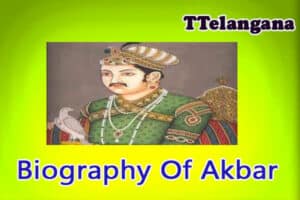Biography Of Akbar
Akbar The Great (1542 to 1605)
Akbar was the most powerful of the Moghul Emperors, who consolidated the vast empire of India and created an idealized culture that promoted the arts and understanding of religion.
A Short Biography of Akbar
Akbar was the son of Humayun the grandchild of Babur. He was the 3rd Moghul Emperor. While the beginning of their reign was filled up with military operations, Akbar displayed a great passion for a broad range of artistic, cultural, philosophical, and religious ideas. Akbar was well-known for his tolerance of religion and, even though he was a Muslim, he took a keen interest in different religions.
Akbar was born on 5 10th October 1542. He was from Umerkot, Rajputana (present-day Pakistan) His father was Humayun and his mother was Hamida Banu Begum. In the time of his father’s exile, Akbar was raised in Kabul by his large family. When he was a child young age, he got married to Ruqaiya his first wife of his.
Biography Of Akbar
As a kid, Akbar was trained in sports, hunting, and the art of war. He was small, yet strong, powerful, and skilled. However, despite his athletic ability, he also maintained a keen interest in reading, learning, and religion. In his early years, He reported experiencing an ethereal experience while walking on his own. After that, he resumed his political and military obligations, however, the spiritual aspect of life was always present.
Akbar became the throne’s heir at the age of 14 on the passing of his father Humayun. Over the next twenty years, Akbar was required to fight for the defense and strengthen his Moghul empire. There was danger coming from Afghans from the North and also from Samrat Hemu, the Hindu King Samrat Hemu. Akbar was regarded as a formidable commander of the military and was unbeaten in major battles in India. Akbar improved the management of the Moghul Army, introducing a non-hereditary military unit called Mansabdar. Akbar made promoted to officer who was admired by the public.
Since Akbar was only a child when becoming the king, the reign of the Moghul Kingdom was initially left to Bairam Khan, an Afghan Shia Muslim. Bairam was an excellent commander and was instrumental in securing his position as the head of the Moghul Empire. But, he wasn’t popular with many because of the power he wielded and the fact that Bairam wasn’t a Sunni Muslim. In one instance, he was urged to make an excursion to Mecca.
Akbar had sent an army to take Bairam Kham, however, Bairam was unhappy with the stigma of being sent to Mecca on a pilgrimage. Thus, he reacted against Akbar’s army and was arrested. Bairam was brought to Akbar where a lot of people were calling for his execution. But, Akbar refused to execute Bairam since he had done a lot for Bairam during the previous time. He was able to forgive Bairam and let him remain in the midst that the courts imposed on him. In his entire existence, Akbar often showed mercy and forgiveness to his enemies, not to mention his brother who was plotting against his brother.
Moghul Empire Under Akbar
Akbar proved adept at uniting the conquered regions of India through reconciliation with princes who had been defeated. He abolished the hated religious tax on Muslims and encouraged Hindus to be part of his administration. Akbar had a good relationship with the Jain community and was greatly influenced by their views on the slaughter of animals. Akbar issued proclamations that banned the slaughter of animals and he also changed his diet to vegetarianism.
Akbar was known for having many positive qualities. He was a fighter and was willing to risk his life. He was generous with the people he knew and also rewarded loyalty. His diet was very frugal, preferring the vegetarian diet.
Akbar showed a keen interest in religion. He encouraged people of various religions to attend his court to discuss the most important religious concepts. Akbar believed that the various religions could coexist with one another, offering various approaches to the same end. In the final years of his career, Akbar aimed to establish his religion which was a blend of various religions. However, it did not go beyond his personality and then disappeared after his death.
The court of Akbar was known as an environment of art and culture as well as education. He employed and promoted people who had a passion for knowledge, wisdom, and understanding. Inside his Royal Court, he had ‘Nine Jewels’, including his biographer and historian of the court, Abu’l-Fazl ibn Mubarak who wrote the Akbar Nama – a vivid story about his personal life. One of the most beloved characters in Akbar was Birbal his court jester. Akbar was impressed by Birbal’s intelligence humor, sense of humor, and ability to educate the Emperor, even if his ideas seemed to be contrary to the opinions of Akbar himself.
Biography Of Akbar
When Birbal was killed in an army campaign, Akbar was distraught
Akbar died in the year 1605 and was laid to rest in the vicinity of Agra. The emperor was replaced as the emperor by his son Prince Salim who later became known as Jahangir.
Tags: Akbar, biography of Akbar, Akbar biography in Hindi, Akbar biography, Akbar history, Akbar the great,jodha akbar, biography, biography of Akbar in Hindi, Mughal emperor Akbar, biography of Mughal emperor Akbar, history of Akbar, Akbar biography in Urdu, article on Akbar biography, Akbar history, and biography, Nawab Akbar Bugti biography, biography of Akbar paragraph, Akbar biography by siddhant sir, Akbar biography by vivek bindra,akbar birbal
